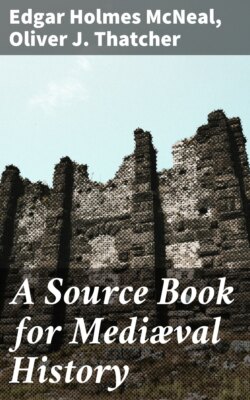Читать книгу A Source Book for Mediæval History - Oliver J. Thatcher - Страница 53
На сайте Литреса книга снята с продажи.
34. The Pope must be Chosen from the Cardinal Clergy of Rome, 769.
ОглавлениеTable of Contents
Enactment of a Latin council held by Stephen III, 769, Cor. Jur. Can., Dist. LXXIX. (See also Mansi, XII, 719.)
C. iii. It is necessary that our mistress the holy Roman Catholic church be governed properly, and in accordance with the precedents established by St. Peter and his successors, and that the pope be chosen from the cardinal priests or cardinal deacons. C. iv. No one, whether layman or clergyman, shall presume to be made pope unless he has risen through the regular grades{57} at least to the rank of cardinal deacon or has been made a cardinal priest.
{57} The grades are given as follows in the Cor. Jur. Can., Dist. LXXVII, c. i. The candidate for the office of bishop must first have been doorkeeper (ostiarius), then reader (lector), then exorcist (exorcista), then consecrated as an acolyte (acolythus), then subdeacon (subdiaconus), then deacon (diaconus), then priest (presbyter), and then if he is elected he may be ordained bishop. The law expressed in chap. iii, so thoroughly in the interests of the ambitious clergy of Rome, was not long observed, for it frequently happened that the bishop of some other city was chosen pope. But it was in accord with previous legislation. The church had early declared against the removal of a clergyman from one congregation to another. Thus the council of Nicæa, 325, in its fifteenth canon (cf. Hefele, Conciliengeschichte, I, pp. 418 f), "forbids bishops, priests, and deacons to move from one town (congregation) to another, because such a practice is against the rule of the church and has often caused disturbances and divisions between congregations. If any bishop, priest, or deacon disobeys this command and removes to another congregation, his action shall be illegal, and he shall be sent back to the congregation which he was serving."
